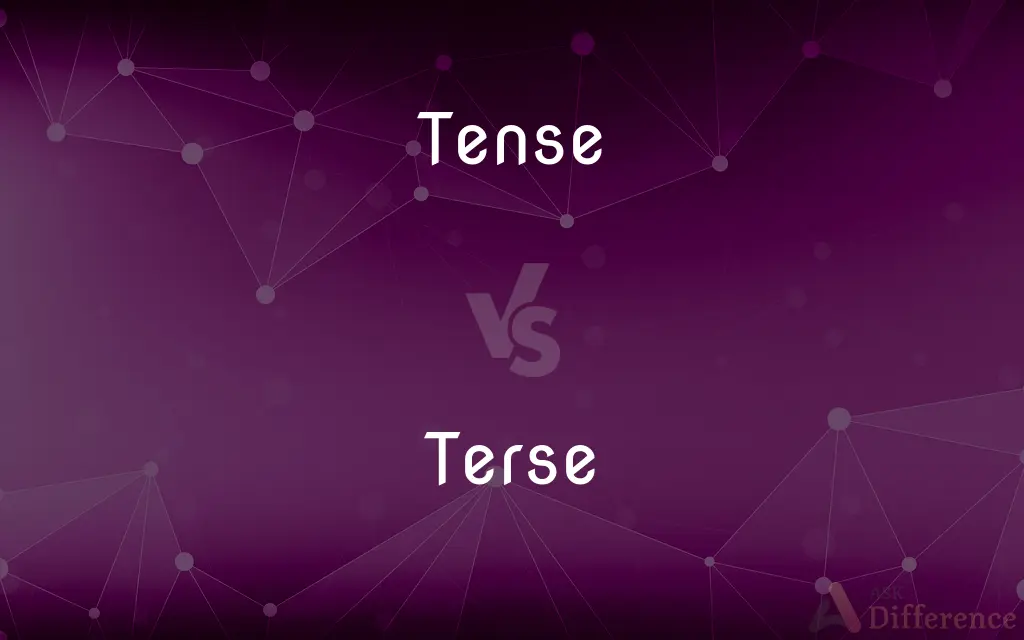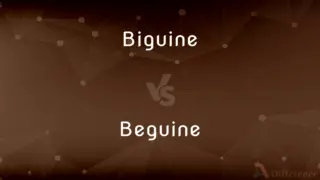Tense vs. Terse — What's the Difference?

Difference Between Tense and Terse
ADVERTISEMENT
Compare with Definitions
Tense
Tightly stretched; taut.
Terse
Sparing in the use of words; abrupt
A terse statement
Tense
In a state of nervous tension or mental strain
Was very tense before the exam.
Terse
Brief and to the point; effectively concise
A terse one-word answer.
Tense
Causing or characterized by nervous tension or mental strain
A tense standoff between border patrols.
ADVERTISEMENT
Terse
(by extension) Of speech or style: brief, concise, to the point.
Tense
(Linguistics) Enunciated with taut muscles, as the sound (ē) in keen.
Terse
(by extension) Of manner or speech: abruptly or brusquely short; curt.
Tense
To make or become tense.
Terse
(obsolete) Burnished, polished; fine, smooth; neat, spruce.
Tense
A property of verbs in which the time of the action or state, as well as its continuance or completion, is indicated or expressed.
Terse
Appearing as if rubbed or wiped off; rubbed; smooth; polished.
Many stones, . . . although terse and smooth, have not this power attractive.
Tense
A category or set of verb forms that indicate or express the time, such as past, present, or future, of the action or state.
Terse
Refined; accomplished; - said of persons.
Tense
Any of the forms of a verb which distinguish when an action or state of being occurs or exists.
The basic tenses in English are present, past, and future.
Terse
Elegantly concise; free of superfluous words; polished to smoothness; as, terse language; a terse style.
Terse, luminous, and dignified eloquence.
A poet, too, was there, whose verseWas tender, musical, and terse.
"In eight terse lines has Phædrus told(So frugal were the bards of old)A tale of goats; and closed with grace,Plan, moral, all, in that short space."
Tense
An inflected form of a verb that indicates tense.
English only has a present tense and a past tense; it has no future tense.
Terse
Brief and to the point; effectively cut short;
A crisp retort
A response so curt as to be almost rude
The laconic reply; `yes'
Short and terse and easy to understand
Tense
The property of indicating the point in time at which an action or state of being occurs or exists.
Dyirbal verbs are not inflected for tense.
Tense
To apply a tense to.
Tensing a verb
Tense
(transitive) To make tense.
Tense
(intransitive) To become tense.
Tense
Showing signs of stress or strain; not relaxed.
You need to relax, all this overtime and stress is making you tense.
Tense
Pulled taut, without any slack.
Tense
One of the forms which a verb takes by inflection or by adding auxiliary words, so as to indicate the time of the action or event signified; the modification which verbs undergo for the indication of time.
Tense
Stretched tightly; strained to stiffness; rigid; not lax; as, a tense fiber.
The temples were sunk, her forehead was tense, and a fatal paleness was upon her.
Tense
A grammatical category of verbs used to express distinctions of time
Tense
Stretch or force to the limit;
Strain the rope
Tense
Increase the tension on;
Tense a rope
Tense
Become tense or tenser;
He tensed up when he saw his opponent enter the room
Tense
Make tense and uneasy or nervous or anxious;
Tense
In or of a state of physical or nervous tension
Tense
Pronounced with relatively tense tongue muscles (e.g., the vowel sound in `beat')
Tense
Taut or rigid; stretched tight;
Tense piano strings
Share Your Discovery

Previous Comparison
Epiphany vs. Revelation
Next Comparison
Biguine vs. Beguine













































